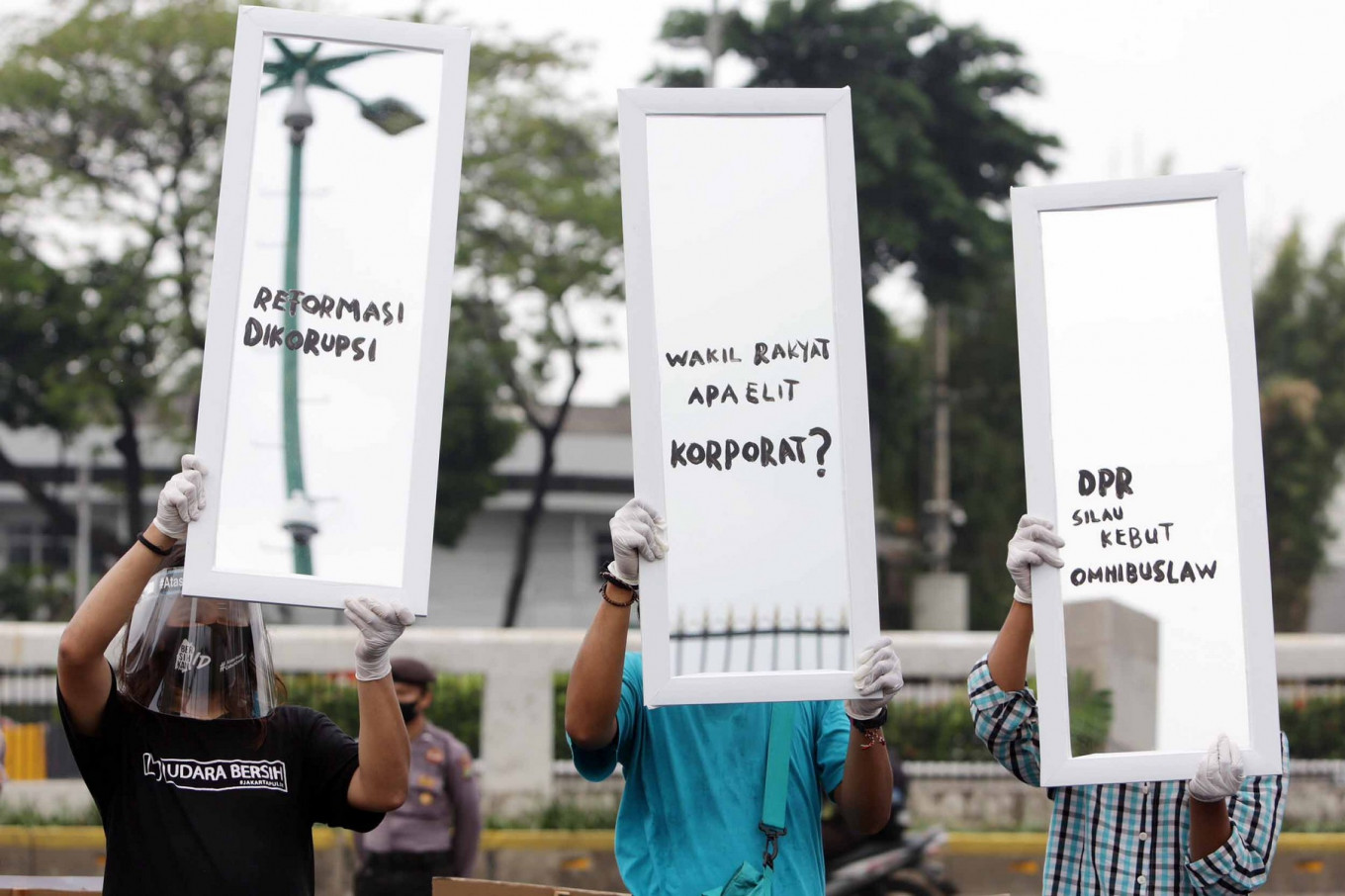Popular Reads
Top Results
Can't find what you're looking for?
View all search resultsPopular Reads
Top Results
Can't find what you're looking for?
View all search resultsPurging corruption key to effective omnibus bill: Experts
Several experts have pointed to eliminating corruption and corrupt officials as the key to the success of the omnibus bill on job creation.
Change text size
Gift Premium Articles
to Anyone
I
ndonesia needs to address corruption to improve public services so that the job creation omnibus bill can bring about the significant changes necessary to attracting investment, experts say.
Sonny Keraf, a politician of the Indonesian Democratic Party of Struggle (PDI-P) and a sustainable development expert, said in a virtual discussion on Tuesday that the government should first get rid of corrupt public officials, including several regional leaders, to streamline the business licensing process.
“As long as corruption remains unaddressed, whatever the bill’s content, there will still be problems in economic, environmental and social development,” said Sonny, who was environment minister from 1999 to 2001.
“If corruption and corrupt public officials are not [eliminated], the [licensure] process is likely to remain difficult,” he added.
According to data from Indonesian Corruption Watch (ICW), 213 civil servants, 149 professionals and 45 village leaders were among the government workers who were declared corruption suspects last year.
However, Indonesia’s score on the corruption perception index (CPI) improved to 40 in 2019 from 38 out of 100 the previous year to indicate a slightly cleaner public sector, according to Transparency International (TI).
On the other hand, Indonesia’s ranking on the World Bank ease of doing business (EODB) index has stagnated at 73rd out of 190 countries for the past two years, despite a slight improvement in its score.
The job creation omnibus bill is intended to be a landmark bill of the Joko Widodo administration in improving Indonesia’s business climate, and is expected to be passed into law by the House of Representatives in October. The bill aims to overhaul the country’s regulatory ecosystem in revising 79 laws and more than 1,200 articles, but has prompted widespread concern, primarily over its potential impact on environmental protection and labor rights.
Read also: Economic recovery depends on stimulus, omnibus bills: Sri Mulyani
Earlier on Aug. 4, senior economist Fadhil Hasan of the Institute for Development of Economics and Finance (Indef), identified corruption, bureaucratic inefficiency and access to financing as the three major factors hindering investment.
“[Corruption] is the most concerning issue that we face in attracting investment, especially foreign direct investment [FDI],” Fadhil said at the time.
Investment Coordinating Board (BKPM) data show that FDI realization fell 6.9 percent year-on-year to Rp 97.6 trillion (US$6.5 billion) in the second quarter as the pandemic hit the global economy.
Lestari Indah, an expert staffer on productivity development at the Office of the Coordinating Economic Minister, said that the use of digital platforms would minimize opportunities for corruption among public officials.
The BKPM currently provides a business licensure service through its online single submission (OSS) platform as part of its drive to simplify bureaucratic processes.
“We are in the [digital] age. Our licensing process will become electronic, all of it. Thus, there will be no need for interaction between potential investors and regional officials,” Lestari stressed. “We hope to solve the corruption issue with this electronic system.”
She added that regional administrations must follow suit by implementing further reforms to reinforce oversight on businesses' compliance with government regulations, including environmental regulations.
The government planned to issue a guiding regulation on norms, standards, procedures and criteria (NPSK) for regional administrations to implement the job creation omnibus bill once it was passed, according to Lestari.
Executive director Robert Na Endi Jaweng of the Regional Autonomy Watch Committee (KPPOD), said that the omnibus bill would reduce the involvement of regional administrations in business licensure because the licensing authority would be “recentralized”.
Regional investment and one-stop service agencies (DPMPTSP) are currently responsible for issuing location, environment and construction permits for businesses, but the omnibus bill will centralize all business licensure through the OSS.
“This is not in line with the mandate of the Constitution,” said Robert. “There are regions with inefficient practices and even corruption. But the way forward is not by backtracking on regional matters.”
Meanwhile, KPPOD researcher Armand Suparman warned that the omnibus bill, including the risk-based permit regime, might have negative impacts on the four pillars of regional competitiveness, namely the environment, the economy, social inclusion and good governance.










